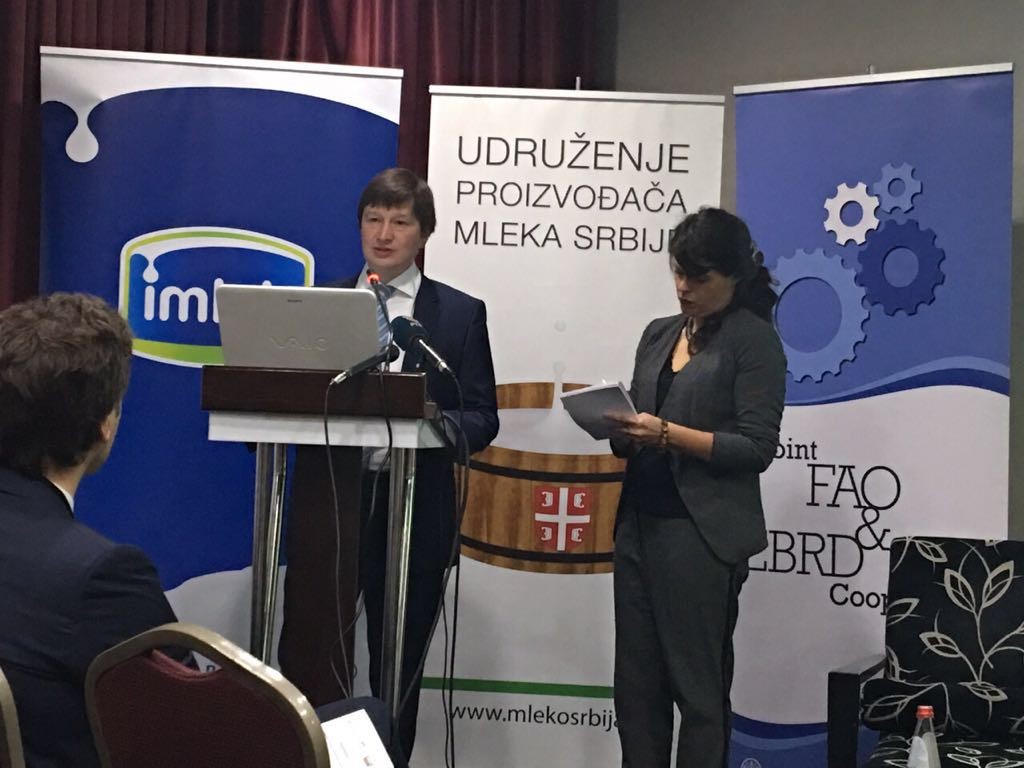Increasing competitiveness in Serbia's dairy sector through improved quality and efficiency

On 24 October, the Second Serbian Dairy Congress gathered farmers, milk processors, animal health specialists, industry experts, representatives of the Ministry of Agriculture and Environmental Protection of Serbia, academia, FAO and EBRD, to discuss how to improve the competitiveness of the Serbian dairy sector through better milk quality, higher production efficiency and better sector coordination. The Serbian Association of Milk Producers (SAMP) organised the congress with the support of FAO and EBRD in the framework of the "Public-private policy dialogue in the Serbian dairy sector" project.
Ljubisa Jovanovic, SAMP President, opened the Congress and invited all stakeholders to discuss and agree on a joint strategy for quality, safety and competitiveness improvement in this vital sector for Serbian agriculture. He highlighted that total milk production has been stagnating in Serbia due to limited purchasing power and export opportunities, while milk quality has remained low, with only 50 percent of the milk sold meeting EU requirements. "Our goal is that in the next 3 to 4 years all milk produced in Serbia would be in the 'extra quality' class" added Jovanovic.
Dmitry Prikhodko, Economist at FAO's Investment Centre Division, noted that global dairy prices have increased by 24 per cent since the time of the first Serbian Congress in 2015, providing a more positive environment for discussions between farmers and processors, while Boris Sterk (Economist, FAO) highlighted export opportunities for the Serbian milk producers and processors resulting from the projected growth of global consumption of milk and dairy products. Mr Prikhodko further observed that "Serbian farmers already receive substantial support from the Government, accounting for almost 70 per cent of all product-specific support to agriculture. However, Serbia has one of the smallest dairy herd sizes in Europe, with only 2.8 cows per household. The dairy sector needs to find ways to increase production efficiency and improve milk quality to become more competitive."
"We believe that efforts of all dairy sector stakeholders to establish a constructive dialogue, such as this Congress, present an excellent platform for discussion on relevant sector issues and addressing the main challenges, such as the much needed reconfiguration of the national agricultural and trade policies in the dairy sector", noted Miljan Zdrale Senior Banker, Head of Agribusiness, South-Eastern Europe, EBRD.
Nenad Terzic from the Ministry of Agriculture and Environmental Protection said that the Government is planning to continue providing strong support to the livestock sector next year. "We will consider a reshuffle of the model of dairy sector support, in line with the suggestions of the Serbian Association of Milk Producers, and shift milk price support to quality-linked premiums", Terzic concluded.
The participants agreed that establishing an accredited National Reference Laboratory is a prerequisite for a fair Government support policy aimed at milk quality and safety improvements and consequently leading to improving the sector's international competitiveness. The EU Instrument for Pre-Accession on Rural Development (IPARD) presents a great opportunity for Serbian farmers to obtain investment funds for technical modernisation, since the current tariff protection will likely decrease in the future.
The milk and dairy products consumption estimates presented by GFK at the congress showed that milk consumption in Serbia is particularly sensitive to quality and food safety information. Goran Zivkov from SEEDEV presented the recently approved national food Quality Label, developed with FAO and EBRD support, as an effective way of promoting higher quality and national origin
The Congress concluded that milk quality improvement and adequate support policies for the sector in view of the existing challenges are important issues to focus on. In this respect, open communication and dialogue between all dairy value chain participants - from milk producers through processors to retail, but also including state institutions, is key for the further development of the dairy sector.
FAO/EBRD efforts in Serbia are contributing to FAO’s strategic objective to enable inclusive and efficient agricultural and food systems.
